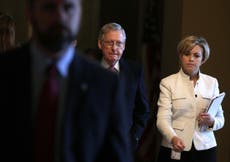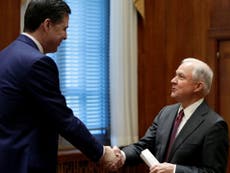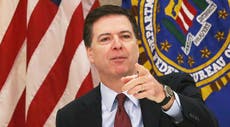Donald Trump's firing of James Comey is completely Nixonian
America's 37th US president resigned nine months after firing a special prosecutor


It feels that almost every week, an historian appears on television scratching to find a precedent for the latest actions or comments of Donald Trump. Frequently they have to reach back decades; sometimes they can find no parallel.
As James Comey boarded a jet in Los Angeles and flew back to Washington, having learned while speaking to field office staff a few hours earlier that he had been fired as FBI Director, focus turned to October 20 1973. It was then, in an incident that has come to be known as the Saturday Night Massacre, that Richard Nixon fired Archibald Cox, a special prosecutor who was looking into the burglary that would snowball into the Watergate scandal.
“This is Nixonian,” Democratic Senator Bob Casey said in a statement.
His colleague from Vermont, Patrick Leahy, said pretty much the same, pointing out that Trump fired Comey “in the midst of one of the most critical national security investigations in the history of our country”. “This is nothing less than Nixonian,” he said.
With a bravado nothing short of stunning, the White House has claimed Comey was fired because of the way he handled the investigation into Hillary Clinton’s use of a private email server - something Trump had previously praised.
During the election campaign, it was Comey’s probe of Clinton, something that ultimately led to no prosecution, that inspired Trump to lead his supporters to chant “lock her up”. On more than one occasion, he praised what he termed Comey’s "guts".
It is hard to believe, then, that something Comey first talked about in the summer of 2016, should necessitate his dismissal. Indeed, with the country spinning from Trump’s action, many observers of Washington have concluded Trump has fired the man investigating alleged links between his campaign and Moscow because he wanted to slow down or divert the probe.
“It’s not just rational that Donald Trump fired James Comey for being mean to Hillary Clinton. It’s not just possible,” said CNN legal analyst Jeffrey Toobin.
He added “He’s heading an investigation that’s getting too close for comfort.”
Presidential historian Douglas Brinkley, professor of history at Rice University, accused Trump of a “stunning abuse of power”. “Donald Trump has just acted like a tyrant,” he said.
Comey was leading one of several probes into Trump’s alleged links to Moscow. In his letter to the FBI Director informing him he had been fired, Trump claimed that Comey had told him three times he was not under investigation.
Yet earlier this year, Comey testified on Capitol Hill that there was an ongoing investigation into possible collusion between Trump’s campaign and Russia’s alleged interference in the 2016 election.
He said the probe, which he said began last July, included “investigating the nature of any links between individuals associated with the Trump campaign and the Russian government and whether there was any coordination between the campaign and Russia's efforts”.
It is unclear what will happen now to the FBI investigation. Various officials said it would proceed.
Others were less convinced. Democrat Dick Durbin said on the Senate floor the news that had broken just hours earlier, raised questions “as to whether the Russian interference in the last presidential election... will also be investigated by the FBI”.
Trump said he acted on “clear recommendations” from Attorney General Jeff Sessions and Deputy Attorney General Rod Rosenstein. Nixon did not have it so easy; his Attorney General and then his Deputy Attorney General, refused to go along with the firing of Cox. In the end it fell to Solicitor General Robert Bork.
Even the Nixon Presidential Library pointed out that there were differences between what happened in 1973 and the action of Mr Trump. “President Nixon never fired the Director of the FBI,” the library tweeted.
If history is a lesson of what may be in store, Trump might wish to be a little concerned. For now, his officials are remaining loyal. But there are likely to be many more twists to this story.
Nixon’s firing of Cox proved increasingly unpopular. Nine months later, with the two houses of Congress preparing to impeach him, Nixon stood down.




Join our commenting forum
Join thought-provoking conversations, follow other Independent readers and see their replies